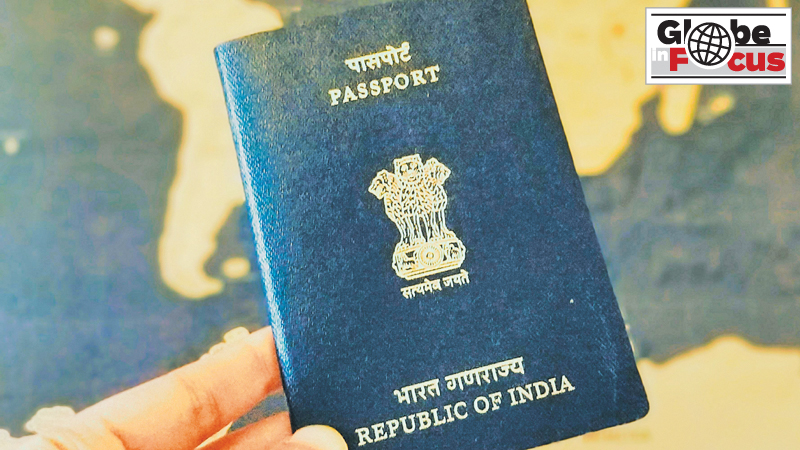India has climbed eight places from 85th to 77th in the 2025 Henley Passport Index (HPI). But it could certainly do better, being the world’s fifth largest economy with a GDP of US$ 4.19 trillion.
The HPI is a measure of visa power, reflecting the relative standing of countries in terms of their economic, geopolitical and security profiles. The HPI is powered by exclusive Timatic data from the International Air Transport Association (IATA). It ranks all the world’s passports based on the number of destinations their holders can enter without a prior visa.
In 2025, Singapore holds the crown as the world’s most powerful passport, with visa-free access to 193 destinations out of 227 globally. Asian nations continue to lead the global mobility race, with Japan and South Korea sharing 2nd place, each granting their citizens access to 190 destinations visa-free.
A strong European contingent occupies the rest of the Top 5.
Seven EU passports share the 3rd place, namely, Denmark, Finland, France, Germany, Ireland, Italy, and Spain, all with access to 189 destinations. The fourth place is held by Austria, Belgium, Luxembourg, Netherlands, Norway, Portugal, and Sweden with visa free entry to 188 countries. New Zealandties in 5th place with Greece and Switzerland.
At the other end of the global mobility spectrum, Afghanistan remains at the bottom of the ranking, with its citizens able to access just 25 destinations without a prior visa.
UK and US drop
The UK and the US have each dropped a place in the global passport rankings since January, continuing a long-term downward trend. Once the most powerful passports in the world — the UK in 2015 and the US in 2014 — they now rank 6th and 10th, respectively.
The UK currently has visa-free access to 186 destinations, while the US trails with 182. Notably, the US is now on the brink of exiting the Top 10 altogether for the first time in the index’s 20-year history.
India has recorded the largest jump in ranking over the past six months, climbing eight places from 85th to 77th, despite only adding two destinations to its visa-free tally, now at 59.
Malaysia, Indonesia, the Maldives, and Thailand are some countries that offer visa-free access to Indian passport holders.
Countries such as Sri Lanka, Macau, and Myanmar, offer visa-on-arrival.
India’s ranking at 77 highlights a complex interplay of factors. This position, while reflective of India’s growing global footprint, also underscores significant diplomatic and bureaucratic challenges that need addressing to enhance its passport strength, says the US-based risk management expert, Vahe Aslanyan (see https://lens.lunartech.ai/author/vahe-aslanyan). India’s extensive diplomatic network, while robust in many regions, faces challenges in establishing visa-free agreements with numerous countries due to geopolitical tensions, regional conflicts, and differing national interests.
To climb the HPI, India must prioritise strengthening bilateral relations, particularly with economically influential and politically stable nations, Aslanyan suggests.
Strategic diplomatic initiatives aimed at reducing visa restrictions and fostering mutual trust are essential for expanding India’s global mobility. Economic stability and growth significantly impact a nation’s passport ranking. India’s burgeoning economy, marked by rapid growth in technology, manufacturing, and services, provides a strong foundation for improving its passport’s global standing. However, economic disparities, bureaucratic inefficiencies, and concerns over regulatory transparency, can impede progress.
India’s challenges
To enhance its passport strength, India must focus on sustaining economic growth, reducing administrative bottlenecks, and ensuring economic policies that build international confidence and trust, Aslanyan says.
Global perceptions of a nation’s security and immigration policies play a crucial role in determining visa policies. India’s efforts to bolster its security infrastructure and streamline visa processes are commendable, yet persistent concerns regarding terrorism, data privacy, and undocumented migration can limit the expansion of visa-free agreements, Aslanyan points out. Implementing advanced security measures, enhancing data protection, and demonstrating compliance with international standards are vital steps towards alleviating these concerns and improving India’s passport rankings, he says.
A comparative analysis with top-ranked nations like Singapore and Japan reveals key areas where India can improve, Aslanyan added.
Both Singapore and Japan benefit from strategic international alliances, high levels of economic development, and efficient governance structures. India, with its diverse socio-political landscape, must undertake targeted reforms to emulate these strengths.
This includes investing in diplomatic missions, fostering economic partnerships, and enhancing administrative efficiencies to create a more favourable environment for global mobility.
To elevate its position in the HPI, India must adopt a multifaceted strategy encompassing diplomatic, economic, administrative, and cultural initiatives.
Here is the long list of things India must do, according to Aslanyan.
“It must strengthen diplomatic ties by proactively negotiate bilateral visa-free agreements with key global players, engage in multilateral forums for more inclusive travel policies; foster alliances through international organisations and regional partnerships; carry out economic reforms to give transparency and reduce bureaucratic inefficiencies; promote sectors that drive global economic influence, such as technology and services; implement policies that ensure sustainable economic growth and build international trust; streamline visa Processes; and improve India’s image as a welcoming destination.”
Economic opportunities
Enhanced passport strength directly correlates with increased economic opportunities and easier access to international markets. It facilitates business travel, investment, and entrepreneurship. For India, which is rapidly expanding its footprint in technology, manufacturing, and services, improved global mobility can attract foreign investment, foster innovation, and drive economic growth.
While the path to improving passport rankings is promising, it is fraught with challenges.
“Geopolitical tensions, regional conflicts, and differing national interests can impede progress. India’s strategic positioning in a volatile region necessitates careful navigation of international relations to avoid conflicts that could adversely affect its passport strength.
Diplomatic agility and proactive conflict resolution are essential to overcoming these barriers,” Aslanyan says.









